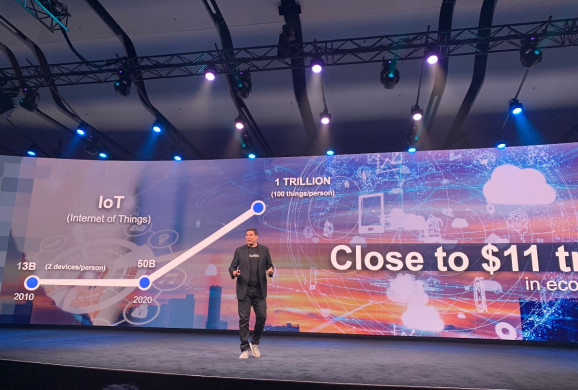SoftBank Group chief operating officer Marcelo Claure said that a trillion connected devices on the internet of things will generate $11 trillion in value by 2025.
That assumes that about 100 IoT devices — which are everyday objects that are smart and connected — will exist for every person, Claure said in a keynote speech at the Arm TechCon 2018 event in San Jose, California.
“In simple terms, there is a lot of money to be made,” said Claure, whose company bought Arm, the biggest designer of computing processors with 130 billion chips shipped, for $31 billion in 2016.
He noted that a survey showed 98 percent of companies have IoT on their strategic roadmaps, and 50 percent see IoT as a strategic priority. And 96 percent of companies expect to increase their spending on IoT in the next three years, Claure said.
“IoT is shifting from boring to massively, massively disruptive,” Claure said.

Above: Simon Segars, CEO of Arm, at Arm TechCon 2018.
Cars are supercomputers with thousands of sensors that will help you stay alive, or, if you get in a crash, send a call for emergency help, he said. The wireless 5G technology that will replace much of the existing cell phone infrastructure will enable up to 100 times data transfer speed, enabling the big data and massive computing needed for IoT.
Simon Segars, CEO of ARM, said in his talk that cars will consume thousands of sensors and processors.
“They’re not only to be data centers on wheels,” he said. “They’re going to be big data on wheels.”
AI-assisted cars will generate 20 gigabytes of data per hour, but fully autonomous cars will generate 20 terabytes of data per hour, Segars said.

Above: ARM CEO Simon Segars at Arm TechCon 2018.
“IoT is about unlocking insights about all of that data,” Segars said. “We’re like in the mainframe era of IoT. But that will change quickly.”
Claure said his company and his boss Masayoshi Son are betting on the Singularity coming within the next 30 years. That’s the day when the collective artificial intelligence will exceed the intelligence of humanity.
“We expect intelligent machines to surpass the ability of the human brain by at least one million times in 30 years,” he said. “The Singularity is coming. Very soon, we will have to teach robots how to deal with people.”
What will this mean? Claure said that you’ll be able to walk straight into your room at the Oyo Hotel (a real hotel chain) where your favorite show will be playing and your air conditioning is set to your preferred level. Uber will be able to deliver your favorite food to you, on demand. Roughly 70 percent of the world’s businesses today uses Arm technology.
“There are some examples of SoftBank investments using artificial intelligence,” he said. “In this new revolution, sensors and IoT will be disruptive.”
Drew Henry, senior vice president at Arm, said that a billion sensors would create 400 exabytes of data a month. That compares to the creation of 150 exabytes of data that the world produces today. The 400 exabytes would require 40 million servers to process the data.

